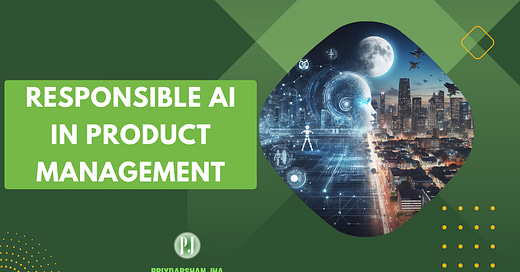Responsible AI in Product Management
Use it as your assistant, don't be its slave. Risks and Remedies of using Generative AI solutions in Product Management.
AI, especially Generative AI has taken the world by storm and Product Management is no different. In the current tech landscape and business environment, Generative AI solutions have emerged as a game-changer for product management.

They can generate content, optimize processes, analyze structured and unstructured data, and offer predictive insights like never before. I am a believer that all these benefits are leverage for Product Managers. It can be your co-pilot, brainstorming partner, research assistant, sounding board, and much more. You can leverage these benefits and then put your focus on more critical areas that have higher future value and impact.
However, as we embrace the potential of AI, it's crucial to have a candid conversation about the associated risks and safety issues. While the benefits of Generative AI are undeniable, we cannot overlook the risks 🧨:
🧨 Bias Amplification: AI models can perpetuate existing biases in the data they are trained on, leading to unfair outcomes and potential discrimination. Biased data can result in AI-driven product recommendations or content suggestions that reinforce stereotypes and discrimination. This could affect user experiences and harm a company's or product’s reputation.
🧨 Misinformation: Gen AI is a powerful tool but AI-generated content can inadvertently generate and spread misinformation or false content. In its current state, if not rigorously checked and monitored, can quickly proliferate across digital platforms, impacting a broad audience.
Photo by Markus Spiske on Unsplash 🧨 Security Threats: This is another big risk that can’t be ignored at any cost. Poorly secured AI models can be exploited, posing significant cybersecurity risks. This can lead to data breaches, PII leaks, violation of data privacy regulations, etc. to name a few. The impact of such a risk is huge, across legal, social, personal, etc. realms.
🧨 Ethical Dilemmas: Decisions about AI-generated content can raise ethical questions such as content ownership and accountability. Additionally, it can result in situations that are technically correct but ethically strained for some set of users.
These are just a few of the high-level risks with deeper and broader risks/impacts on your product by the irresponsible use of Gen AI tools.
However, not everything is gloomy and there is light at the end of the tunnel. By being more responsible 🛡️ and taking care of some of the fundamentals while leveraging any Gen AI offering you can significantly reduce the above risks.
🛡️ Diverse Data: Bias amplification is a huge risk originating from the training data. The risk can be significantly reduced by the use of diverse and representative training data, data pre-processing, data cleansing, data fairness assessments, and setting guidelines to explicitly prohibit discrimination and promote fairness, diversity, and inclusion.
🛡️ Robust Testing: Information needs to be checked to control misinformation. A rigorous AI model testing process would ensure enhanced information correctness and better alignment with factual accuracy. Additionally, the above remedies of diverse and accurate data would help enhance confidence in the information generated by the Gen AI models.
🛡️ Security Protocols: Security threats have to be counterbalanced by adequate security. I am not a digital security expert by any means but security measures such as encryption, strong access protocols, continuous threat assessment and patching, and security audits are some of the foundational aspects that will keep the good guys a step ahead of the bad ones.
🛡️ Ethical Guidelines: For humans, ethics comes from upbringing and environment, and for machines, it is established by strong guidelines. Setting boundaries with clear ethical guidelines, embedding foundational constraints, etc. will enable ethical fairness from the Gen AI. Additionally, this needs to be further strengthened by fostering human cross-functional collaboration that cuts across teams, roles, geographies, seniority, etc. to address the negative ethical challenges.
Most of the suggested measures here are highly technical and mostly outside the technical expertise of a product manager. However, by just being aware and proactive about these risks and remedies you can ask the right questions and be cautious about using Gen AI solutions in a more responsible manner in your day-to-day life as a product manager.
🤝 Collaboration is Key to navigating the challenges of Generative AI in product management, collaboration between product managers, data scientists, and all product team roles and ethicists is crucial. Together, we can create responsible AI-driven solutions that empower innovation while prioritizing safety and ethics.
Embracing Generative AI in product management is inevitably exciting, but it needs to be used more responsibly to be able to leverage it to the fullest. By recognizing the risks, prioritizing safety, applying remedies, and fostering collaboration, we can harness the full potential of AI while upholding our commitment to ethical and responsible innovation.
🌟 Let's build a future where AI enhances our products while safeguarding our values.
Although this post is written in the context of Product Management and for Product Managers, the risks highlighted are universal and the safety measures discussed would be helpful in any business scenario where Gen AI tools are being used to do the knowledge work.






